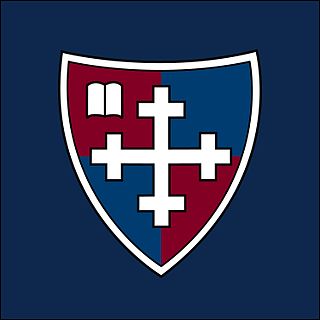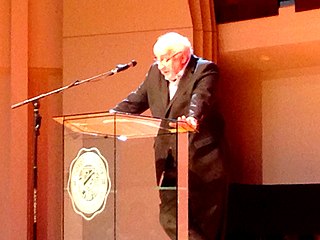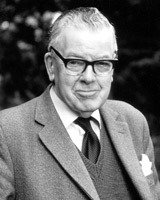
Marvin R. Wilson is an American evangelical Biblical scholar, and was the Harold J. Ockenga Professor of Biblical and Theological Studies at Gordon College in Wenham, Massachusetts until his 2018 retirement. [1]

Marvin R. Wilson is an American evangelical Biblical scholar, and was the Harold J. Ockenga Professor of Biblical and Theological Studies at Gordon College in Wenham, Massachusetts until his 2018 retirement. [1]
Wilson graduated from Wheaton College (A.B., cum laude), Gordon-Conwell Theological Seminary (M.Div., summa cum laude) and Brandeis University (M.A., Ph.D.). [2]
Wilson taught at Barrington College and chaired its Department of Biblical Studies. [2] He become a professor at Gordon in 1971, a position he held until his retirement in 2018. He taught Old Testament, Hebrew, Jewish history and culture, and modern Judaism. He also served as an Old Testament translator and editor of the New International Version Bible as well as contributing notes to two of the Old Testament books in the NIV Study Bible. Apart from writing over 200 articles or reviews Wilson is also a frequent speaker in synagogues, conferences, and on TV and radio. One of Wilson’s most notable contributions is his textbook Our Father Abraham: Jewish Roots of the Christian Faith which is in its 29th printing. Foreign translations include French, Italian, Czech, Chinese, Japanese and Korean. Wilson has also co-edited 3 books on Jewish-Christian relations: Evangelicals and Jews in Conversation, Evangelicals and Jews in an Age of Pluralism, and A Time to Speak: The Evangelical-Jewish Encounter. He also served as primary scholar for the award winning, two-hour national public TV documentary Jews & Christians: A Journey of Faith. [1]
Wilson joined Edwin Yamauchi (Professor of History emeritus, Miami University) as co-editor and author of the four-volume reference work Dictionary of Daily Life in Biblical and Post-biblical Antiquity (Hendrickson Publishers, 2014–16).
A collection of twenty essays written by Christian and Jewish scholars was presented as a surprise to Wilson at a recent Gordon College commencement. This Festschrift is titled Perspectives on Our Father Abraham in Honor of Marvin R. Wilson (ed. Steven A. Hunt, Grand Rapids: Wm. B. Eerdmans Publishing Co.).
Wilson is married to Polly, a pianist. [1]

Gordon–Conwell Theological Seminary (GCTS) is an evangelical seminary with its main campus in Hamilton, Massachusetts, and three other campuses in Boston, Massachusetts; Charlotte, North Carolina; and Jacksonville, Florida. According to the Association of Theological Schools, Gordon-Conwell ranks as one of the largest evangelical seminaries in North America in terms of total number of full-time students enrolled.

Christian Zionism is a political and religious ideology that, in a Christian context, espouses the return of the Jewish people to the Holy Land. Likewise, it holds that the founding of the State of Israel in 1948 was in accordance with biblical prophecies transmitted through the Old Testament: that the re-establishment of Jewish sovereignty in the Levant—the eschatological "Gathering of Israel"—is a prerequisite for the Second Coming of Jesus Christ. The term began to be used in the mid-20th century, in place of Christian restorationism, as proponents of the ideology rallied behind Zionists in support of a Jewish national homeland.
Gordon Donald Fee was an American-Canadian Christian theologian who was an ordained minister of the Assemblies of God (USA). He was professor of New Testament Studies at Regent College in Vancouver, British Columbia, Canada.

Richard John Mouw is an American theologian and philosopher. He held the position of President at Fuller Theological Seminary for 20 years (1993–2013), and continues to hold the post of Professor of Faith and Public Life.

Frederick Fyvie Bruce was a Scottish evangelical scholar, author and educator who was Rylands Professor of Biblical Criticism and Exegesis at the University of Manchester from 1959 until 1978 and one of the most influential evangelical scholars of the second half of the twentieth century. When the academic community looked down upon Evangelicals, Bruce demonstrated that a scholar holding evangelical views could do worthwhile academic work. He persuaded Evangelicals that they should not turn their backs on academic methods of Bible study, even if the results might differ from traditional evangelical views. As a result, he has been called the "Dean of Evangelical Scholarship".
Donald Arthur Carson is a Canadian evangelical theologian. He is a Distinguished Emeritus Professor of New Testament at Trinity Evangelical Divinity School and president and co-founder of the Gospel Coalition. He has written or edited about sixty books and served as president of the Evangelical Theological Society in 2022.
Paul King Jewett (1920–1991) was an American Christian theologian, author and prominent advocate of the ordination of women and of believer's baptism. He taught systematic theology at Fuller Theological Seminary in Pasadena, California. He is credited with helping develop Fuller into one of the largest seminaries in the country.
Edward John Carnell was a prominent Christian theologian and apologist, was an ordained Baptist pastor, and served as President of Fuller Theological Seminary in Pasadena, California. He was the author of nine major books, several of which attempted to develop a fresh outlook in Christian apologetics. He also wrote essays that were published in several other books, and was a contributor of articles to periodicals such as The Christian Century and Christianity Today.

Richard N. Longenecker was a New Testament scholar. He held teaching positions at Wheaton College and Graduate School ; Trinity Evangelical Divinity School (1963-72); Wycliffe College ; University of St. Michael’s College ; and McMaster Divinity College. His education included B.A. and M.A. degrees from Wheaton College, and a Ph.D. from New College in the University of Edinburgh.
Harold John Ockenga was a leading figure of mid-20th-century American Evangelicalism, part of the reform movement known as "Neo-Evangelicalism". A Congregational minister, Ockenga served for many years as pastor of Park Street Church in Boston, Massachusetts. He was also a prolific author on biblical, theological, and devotional topics. Ockenga helped to found the Fuller Theological Seminary and Gordon-Conwell Theological Seminary, as well as the National Association of Evangelicals (NAE).

The Hebrew Roots Movement (HRM) is a religious movement that advocates adherence to the Torah and believe that Yeshua or Jesus, is the Messiah. The movement stipulates that the Law of Moses was not abolished by Yeshua or Jesus and is, therefore, still in effect for his followers. Because HRM believes the Mosaic law is still active, it advocates the keeping of the seventh-day Sabbath; biblical feasts; laws of cleanliness; and circumcision. Some HRM followers also choose to wear tzitzit and other Hebrew religious items. However, HRM followers do not generally follow Judaism or embrace the Talmud. Unlike other Christians, most HRM followers reject the traditional holidays of Christmas and Easter, insisting that they are extra-biblical traditions.

Ben Witherington III is an American Wesleyan-Arminian New Testament scholar. Witherington is Professor of New Testament Interpretation at Asbury Theological Seminary, a Wesleyan-Holiness seminary in Wilmore, Kentucky, and an ordained pastor in the United Methodist Church.
George Eldon Ladd was a Baptist minister and professor of New Testament theology and exegesis at Fuller Theological Seminary in Pasadena, California, known in Christian eschatology for his promotion of inaugurated eschatology and "futuristic post-tribulationism."
Jon Douglas Levenson is an American Hebrew Bible scholar who is the Albert A. List Professor of Jewish Studies at the Harvard Divinity School.

Marc H. Tanenbaum (1925–1992) was a human rights and social justice activist and rabbi. He was known for building bridges with other faith communities to advance mutual understanding and co-operation and to eliminate entrenched stereotypes, particularly ones rooted in religious teachings.
Old Testament theology is the branch of Biblical theology that seeks theological insight within the Old Testament or Hebrew Bible. It explores past and present theological concepts as they pertain to God and God's relationship with creation. While the field started out as a Christian endeavor written mostly by men and aimed to provide an objective knowledge of early revelation, in the twentieth century it became informed by other voices and views, including those of feminist and Jewish scholars, which provided new insights and showed ways that the early work was bound by the perspectives of their authors.
James R. Edwards is an American New Testament scholar. His primary research interests include Biblical studies and the history of the early church, with secondary interests in the Reformation and history of the twentieth-century German Church struggle. After gaining degrees from Whitworth University (B.A.), Princeton Theological Seminary (M.Div.), and Fuller Theological Seminary (Ph.D.), and further study at the University of Zurich and the University of Tübingen, Tyndale House (Cambridge), and the Center of Theological Inquiry (Princeton), in 1997 he joined the faculty at Whitworth University, Spokane, Washington. He continues his work as Professor Emeritus of Theology.

Israel College of the Bible, also known as ONE FOR ISRAEL Bible College is a Christian evangelical fundamentalist private Hebrew-speaking Messianic Bible college in Netanya, Israel. It is an independent academically accredited institution not recognized by the State of Israel.
Elizabeth Rice Achtemeier was an American ordained Presbyterian minister, Bible professor, and author.
Brant James Pitre is an American New Testament scholar and Distinguished Research Professor of Scripture at the Augustine Institute. He has written extensively on the historical Jesus, the Virgin Mary, Paul the Apostle, the origin of the Eucharist, and the canonical Gospels.